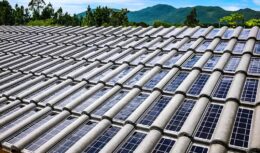
Investing in renewable energy and decreasing dependence on oil will make Vietnam's economy grow at least 5% a year.
Vietnam, a country located in Southeast Asia, with a population of 100 million citizens, is one of the most vulnerable nations in terms of weather events and rising sea levels with the melting of glaciers. And, to guarantee the security of the population regarding energy and the energy matrix, it is estimated that they will have to spend more than US$ 368 billion until the year 2040 with new investments in the area.
According to analysts, the State cannot be shy about its environmental decisions, and it is crucial that it changes its consumerist policy. The same goes for Brazil, which has been investing massively in mining, oil and gas and is more susceptible to commodity variations.
The values were revealed by the World Bank and show the country's extreme concern to reach its climate goals soon, the transition investments started late. With the oil crisis, in which the barrel presented an exponential accumulation of at least 120% per year, they suffered for the purchase of barrels and maintenance of the logistical systems.
Investment above 6% of annual GDP to obtain results
O World Central Bank estimates that Vietnam will have to invest at least 6,8% of its entire GDP, annual Gross Domestic Product, with the change in the energy matrix to the use of renewable and environmental energy sources.
Although the value seems high, the bank warns that, if there is no initiative from the country, it could commit up to 14% of its GDP by 2050 due to negligence in the past. The data were released this Thursday, July 14, after a market analysis.
The report shows that Vietnam needs detailed pathways to build a sustainable energy matrix and reduce indium carbon emissions to the environment. Removing the economy's dependence on carbon and large industries is a way of preparing citizens for the “new sustainable world post 2030” with the attempt to decarbonize the great powers.
Following a sustainable path will allow Vietnam to grow its GDP by 5% per year
The report shared by the Central Bank shows that, by following more sustainable paths and creating innovative policies to encourage the use of solar energy and decrease carbon dioxide emissions, Vietnam's Gross Domestic Product will grow at the same 5% per year.
“Vietnam cannot be shy about climate change. Must act, and must act boldly,” said Darryl J. Dong, Interim Country Manager for Vietnam at the International Finance Corporation. According to Dong, the change will not be easy and cheap. However, it is something that all countries will have to go through, obligatorily, to continue in a globalized world and negotiate with great powers. There is no longer any way for governments to choose whether or not to participate in structural energy change.
Ding ended the interview by saying that the government will not be able to finance a large part of this change in the energy matrix and environmental policies. In this way, the private sector must count on a large participation by investing half of the necessary amount.
Brazil can go the same way
A As of 2023, the Brazilian government intends to start taxing all solar energy produced with ICMS. With that in mind, those who install from next year will have one less incentive to make the energy transition.
Brazil has been investing massively in oil and mining, non-renewable resources in nature, and its economy may be harmed in the long term by extreme dependence and a possible decrease in exports.










And where is marine biodiversity?…
I hope it sells quickly...
How embarrassing! Before writing any article,…
TO COMPLETE THESE THEY PUT GENERAL WATERMELON🍉 TOMÁS…
Approved. Where to find? What is the estimated price?…
WHAT A DISSERVICE! The solution to waste…
Very cool!
35 tons of gold went to…